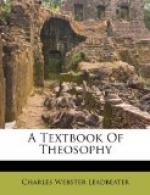We are neither the only nor even the principal inhabitants of our solar system; there are other lines of evolution running parallel with our own which do not pass through humanity at all, though they must all pass through a level corresponding to that of humanity. On one of these other lines of evolution are the nature-spirits above described, and at a higher level of that line comes this great kingdom of the angels. At our present level of evolution they come into obvious contact with us only very rarely, but as we develop we shall be likely to see more of them—especially as the cyclic progress of the world is now bringing it more and more under the influence of the Seventh Ray. This Seventh Ray has ceremonial for one of its characteristics, and it is through ceremonial such as that of the Church or of Freemasonry that we come most easily into touch with the angelic kingdom.
When all the man’s lower emotions have worn themselves out—all emotions, I mean, which have in them any thought of self—his life in the astral world is over, and the ego passes on into the mental world. This is not in any sense a movement in space; it is simply that the steady process of withdrawal has now passed beyond even the finest kind of astral matter; so that the man’s consciousness is focussed in the mental world. His astral body has not entirely disintegrated, though it is in process of doing so, and he leaves behind him an astral corpse, just as at a previous stage of the withdrawal he left behind him a physical corpse. There is a certain difference between the two which should be noticed, because of the consequences which ensue from it.
When the man leaves his physical body his separation from it should be complete, and generally is so; but this is not the case with the much finer matter of the astral body. In the course of his physical life the ordinary man usually entangles himself so much in astral matter (which, from another point of view, means that he identifies himself so closely with his lower desires) that the indrawing force of the ego cannot entirely separate him from it again. Consequently, when he finally breaks away from the astral body and transfers his activities to the mental, he loses a little of himself he leaves some of himself behind imprisoned in the matter of the astral body.
This gives a certain remnant of vitality to the astral, corpse, so that it still moves freely in the astral world, and may easily be mistaken by the ignorant for the man himself—the more so as such fragmentary consciousness as still remains to it is part of the man, and therefore it naturally regards itself and speaks of itself as the man. It retains his memories, but is only a partial and unsatisfactory representation of him. Sometimes in spiritualistic seances one comes into contact with an entity of this description, and wonders how it is that one’s friend has deteriorated so much since his death. To this fragmentary entity we give the name “shade”.




